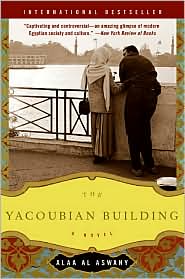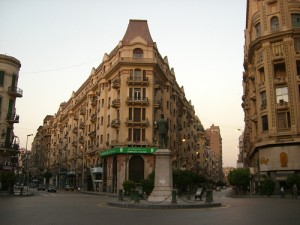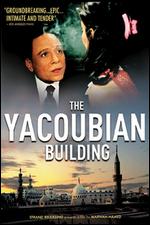“This country doesn’t belong to us…It belongs to the people who have money. If you’d had twenty thousand pounds and used them to bribe someone, do you think any one would have asked about your father’s job? Make money…and you’ll get everything, but if you stay poor, they’ll walk all over you.”
 The Yacoubian Building is a true blockbuster—“the best-selling novel in the Middle East for two years and the inspiration for the biggest budget movie ever produced in Egypt,” according to National Geographic. American readers coming to this novel will find it a vibrant and descriptive primer illuminating the various forces in contemporary Egypt that affect its current political climate. It is also a thoughtful analysis of why certain forces are as influential as they are today—the movement for democracy, the growing Islamist counterculture, the power of the sheikhs and their differences in scriptural interpretation, the inbred culture of the military and the police, the student movements, and, most of all, the long-term influence of generations of poverty.
The Yacoubian Building is a true blockbuster—“the best-selling novel in the Middle East for two years and the inspiration for the biggest budget movie ever produced in Egypt,” according to National Geographic. American readers coming to this novel will find it a vibrant and descriptive primer illuminating the various forces in contemporary Egypt that affect its current political climate. It is also a thoughtful analysis of why certain forces are as influential as they are today—the movement for democracy, the growing Islamist counterculture, the power of the sheikhs and their differences in scriptural interpretation, the inbred culture of the military and the police, the student movements, and, most of all, the long-term influence of generations of poverty.
Set in a ten-story building built in 1934 and located in downtown Cairo, the Yacoubian building was once the ultimate in luxury, located in an area in which the most elegant of European activities took place and where Europhiles gathered to eat, drink and socialize. In the ensuing years, the Yacoubian Building has changed its character, as has the surrounding neighborhood, and it is now a microcosm of life in Egypt. The small iron rooms on the roof, which were once used for storage by each apartment owner, are now occupied as tiny residences by poor people who have set up a whole community on the roof. The elegant apartments which once housed the elite have now attracted the military and politi cians who took over after the revolution of 1952, when the wealthiest citizens lost much of their property and their investments. The beautiful boutiques on the ground floor are now more plebian retail outlets, and the bars and cocktail lounges there now must hide their alcoholic inventory and make payoffs to stay in business.
cians who took over after the revolution of 1952, when the wealthiest citizens lost much of their property and their investments. The beautiful boutiques on the ground floor are now more plebian retail outlets, and the bars and cocktail lounges there now must hide their alcoholic inventory and make payoffs to stay in business.
Using a conversational and unpretentious style to create characters that the reader comes to care about, Alaa Al Aswany shows his characters’ home life in the Yacoubian Building, his/her dreams and goals, the nature of life in the city at large, and the impediments to success. Many residents are poor, and some have become poor as a result of their property being seized by the government after the revolution of 1952. No one at the Yacoubian Building is secure in any aspect of his/her life.
Among the residents is Zaki Bey el Dessouki, age sixty-five, a legend, a man who gives advice about sex to the young men on the block. His servant, Abaskharon, a  cripple who has raised three daughters and who helps support his brother, is secretly stashing away funds to buy one of the iron rooms on the roof. Taha, the son of the doorman Shazli, having been a conscientious and extremely hardworking student, is preparing for the police academy, a job he’s wanted all his life. Also in the Yacoubian Building are Hatim Rasheed, a gay newspaper editor, and his lover; Hagg Muhammad Azzam, very wealthy, who is believed to be involved in drug dealing; Kamal el Fouli, a law professor who is also a corrupt.
cripple who has raised three daughters and who helps support his brother, is secretly stashing away funds to buy one of the iron rooms on the roof. Taha, the son of the doorman Shazli, having been a conscientious and extremely hardworking student, is preparing for the police academy, a job he’s wanted all his life. Also in the Yacoubian Building are Hatim Rasheed, a gay newspaper editor, and his lover; Hagg Muhammad Azzam, very wealthy, who is believed to be involved in drug dealing; Kamal el Fouli, a law professor who is also a corrupt.
Within the subplots involving all these characters, their wives, girlfriends, and sisters, Al Aswany creates a vibrant community, and as they all face problems (from small setbacks to major disasters), he also shows how each deals with his problems. Women routinely take jobs in which they know they will suffer sexual abuse because they need the money. Always in the background is the contest of wills between those who wish for true democacy and those committed to an Islamist future.
abuse because they need the money. Always in the background is the contest of wills between those who wish for true democacy and those committed to an Islamist future.
Al Aswany’s remarkable study of the conversion of one character into a committed Islamist will resonate with westerners who read it, as it speaks more clearly than anything else I’ve read on why someone would take this route. The reasons that most westerners ascribe to these decisions do not really pertain here, and as Al Aswany shows through his character’s reading of the scriptures why terrorism “makes sense” to him, western readers may also see why there is very little that non-Muslims can do to prevent the kind of absolute thinking that results in jihad, the commitment of people who truly believe that they are doing God’s work.
Simple in style, beautifully descriptive of daily life, insightful regarding the humanity of his characters, and filled with the kind of detail that enables the very best novels to communicate on an emotional level with readers from other cultures, Alaa Al Aswany’s novel has depicted Egypt with all its variety, its energy, and its hopes within the microcosm of the Yacoubian Building.
ALSO by Al Aswany: ON THE STATE OF EGYPT: A Novelist’s Provocative Reflections, a series of articles written in the year leading up to the revolution on January 25 – February 11, 2011.
Notes: The author’s photo and an outstanding interview with him are from http://ngm.nationalgeographic.com
The actual Yacoubian Building in Cairo is shown here: http://www.usabloggen.se
The film poster appears on http://www.imdb.com
The trailer for the biggest budget film in Egypt’s history is here:
